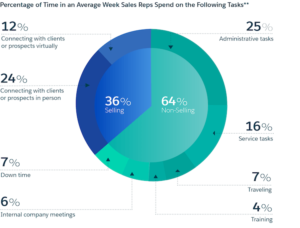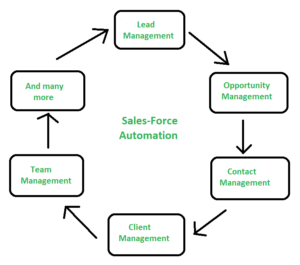Your Complete Guide to Sales Productivity
Sales productivity is all about closing more deals per hour worked. How productive is your sales force – and how can you help increase their productivity?
This guide will show you how.
What Affects Sales Productivity?
Sales productivity is a combination of efficiency and effectiveness. The more efficient and effective a sales rep is, the higher his or her productivity.
Sales efficiency reflects how sales reps allocate their resources – in particular, their time. Sales effectiveness is about converting leads into sales. These two factors combine to track sales productivity, as detailed in the following formula:
Sales productivity = efficiency X effectiveness
Reps can increase sales productivity by being more efficient with their time, more effective in their sales efforts, or by some combination of both. Reps who close more sales per day will significantly increase their sales productivity.
How to Measure Sales Productivity
Sales productivity is an elusive metric to measure. In fact, sales productivity is best measured by a combination of metrics – it’s not just the number of sales closed.
Conversion Rate
The first metric for measuring sales productivity is the conversion rate. This metric provides essential insights into how effective reps are at generating sales. In other words, how many leads it takes to generate a sale.
Win Rate
Another useful metric for measuring sales productivity is the win rate – the ratio of closed sales to viable opportunities. Most companies realize a win rate of one closed deal for every three opportunities. Any reps falling below this average probably need to improve their productivity.
Average Deal Size
Who is more productive – a rep that closes more but smaller deals or one that closes fewer but bigger deals? You need to track not just the win rate but also the size of those deals. Reps who focus on closing smaller deals may not be pursuing larger opportunities.
Length of Sales Process
How long does it take for a salesperson to close a sale? You want to measure the time from initial lead generation to closing the deal. Reps who take longer than the average are not as productive as your other reps.
Customer Retention Rate
Finally, a salesperson should aim to cultivate customers for future business. Tracking the customer retention rate is a less immediate metric but one that measures the true long-term impact of a sales rep.
5 Top Strategies for Improving Sales Productivity
According to Salesforce data, sales reps spend only 36% of their time selling, on average. The other two-thirds of their time is spent performing administrative tasks, attending meetings, and the like – that is, not actively selling. Knowing this, how can you improve your team’s sales productivity? Here are some of the top strategies.
Prioritize high impact, urgent activities
1. Provide Effective Sales Training
A well-trained sales force is a more productive sales force. Research indicates that high-performing sales teams are twice as likely to provide ongoing training than teams with lower performance.
Your reps need to be trained not just in the products and services you offer but also in the most effective sales methods. Conducting frequent training is also important, as studies show that reps forget 87% of what they learn within a month. The more often you reinforce your sales training, the more your reps will retain.
The following video details some of the many benefits of sales training.
2. Prioritize High-Impact Tasks – and Delegate Everything Else
One major issue affecting sales productivity is that sales reps spend too much of their time on everything except interfacing with customers. Reps need to spend less time on sales operations and more time on customer-facing activities that drive revenue. That means shifting some of these administrative tasks to other non-sales staff. Delegating less impactful but still necessary activities will produce better results overall.
3. Assign Reps Based on Market Potential, Not Market Size
Traditionally, most companies assign reps geographically, based on market size. A more innovative approach is to organize your sales force based on market potential, not size. You want to expend more effort in markets that have the most sales potential.
Start by differentiating between your company’s high-growth and low-growth markets. To maximize your ROI, assign your more productive reps to the higher-growth markets. Assign less-productive markets to reps that are better at maintaining rather than growing sales. This approach has led some companies to achieve market growth one and a half times industry averages.
4. Constantly Re-Evaluate Your Sales Processes
To continue to boost sales productivity you need to constantly analyze what you’re doing and how successful it is. It’s a matter of fine-tuning your sales processes for improved productivity.
This requires a regular analysis of your sales activities. Is your productivity increasing or decreasing? Determine those activities that result in sales productivity and reinforce them. Likewise, be prepared to alter or shift from those strategies that are not increasing productivity. You need to be analytical, and you need to be ruthless.
You also need to adapt. As market conditions change your sales strategies must change too. Be on the lookout for new strategies and tools that can help you increase sales productivity – and be willing to move on a dime if you need to.
5. Embrace Sales Automation
A final strategy for improving sales productivity is to embrace new technology that helps to automate the sales process. Customer relationship management (CRM) platforms such as Salesforce can help automate many non-customer-facing tasks, including:
- Lead generation
- Appointment scheduling
- Creation of support materials
- Proposal/quote creation
- Emails
- Activity tracking
The more you can automate the mundane tasks, the more productive your sales reps will be.
Let Rainmaker Help Improve Your Sales Productivity
Salesforce helps you increase the productivity of your sales team and Rainmaker can help you get the most out of Salesforce. Our Salesforce experts have the real-world experience you need to automate your sales processes and improve your sales productivity. We offer a wide variety of Salesforce Managed Services that help your sales force sell more efficiently and effectively. We’ve helped hundreds of sales forces just like yours become more productive – let us help your team too.
Contact Rainmaker today to learn more about increasing your sales productivity!








